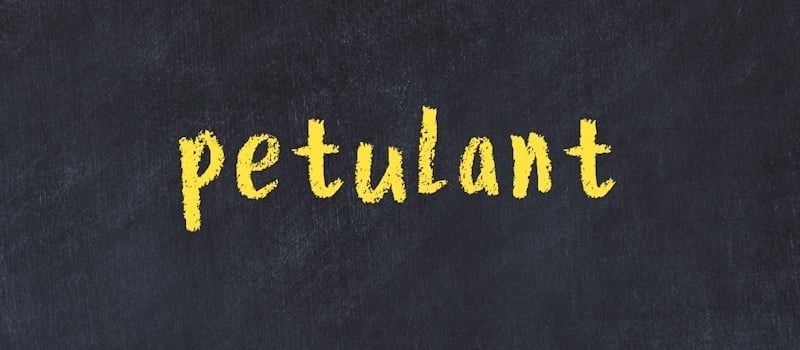Learning new words is not just for schooling kids and non-native English speakers; the English language has multiple words each of us can learn daily. For instance, one of the many words worth learning about is “petulant.” Are you aware of the petulant definition?
Petulant means “moved to or showing sudden, impatient irritation, especially over some trifling annoyance.” Use this term when describing someone insolent or rude in speech or behavior. The word “petulant” also applies when referring to behavior characterized by temporary or capricious ill humor.
Petulant is a less common English word that you will rarely hear people use in general conversations. However, it is worth learning as it applies in many contexts. This article discusses the definition, meaning, usage, and different contexts of “petulant.”
What is the Definition of Petulant?
Our first definition of petulant is “moved to or showing abrupt, exasperated irritation, particularly over some trifling annoyance.”
Below are some sentence examples:
- You can tell when he is unwell by the petulant toss of his head.
- Whenever Alex argues with his siblings, he displays petulant movements around the house.
- They can concurrently be well-regarded as heroes in the park and act like petulant children in the street.
What is the Meaning of Petulant?
Petulant also means “insolent or rude in speech or behavior.” It also means characterized by temporary or capricious ill-humor.
Here are some sentence examples:
- The constituents acted like petulant crybabies until they got what they wanted.
- Ken walked into the room impeccably groomed, but a petulant expression on her face blemished her good looks.
- People steer clear of Amanda because of the constant petulant face droop she always displays.
Archaic Meaning of Petulant
Like most English words with long histories, “petulant” has archaic meanings. These are meanings that are no longer applicable in modern English. Petulant’s ancient or obsolete meaning is “forward, pert, or wanton.”
Over the years, the petulant meaning evolved to describe a person in a bad mood or inclined to complain. This word also referred to a feeling angry or annoyed, mostly over a small or petty issue. A person fond of or prone to quarreling was also regarded as petulant. These evolved meanings are very close to or similar to the word’s current meaning.
Synonyms of Petulant
Incorporating synonyms as you learn a new word is essential. The knowledge of synonyms helps you understand the new word better. It also comes in handy when writing, as you do not have to use the same word repeatedly. Furthermore, this is also an opportunity to learn other words and develop your vocabulary.
Below are words with similar meanings (synonyms) as petulant;
- Cranky
- Cross
- Grumpy
- Irascible
- Irritable
- Sulky
- Testy
- Uptight
- Fiery
- Fretful
- Peevish
- Ratty
- Surly
- Touchy
- Choleric
- Crabby
- Huffy
- Huffish
- Impatient
- Moody
- Prickly
- Vexed
- Snappy
- Sullen
- Whingy
- Chippy
- Crabbed
- Narky
- Pettish
- Pouty
- Snappish
- Sour
- Eggy
- Grumbling
- Peckish
- Snarky
- Soreheaded
- Tetchy
- Whining
- Mean
- Miffy
- Pouting
- Techy
- Mary
- Raspy
- Salty
- Waspish
- Caviling
- Complaining
- Mardy
Antonyms of Petulant
Antonyms are the opposite of synonyms. They are words with opposite meanings. Learning antonyms is as important as studying the synonyms of new words. Whether you are a writer or an avid speaker, these words come in handy.
There are several dozens of antonyms for petulant. Below are some of the most common;
- Affable
- Friendly
- Genual
- Pleasant
- Gregarious
- Jovial
- Sociable
- Cordial
- Warm
- Civil
- Gracious
- Open
- Relaxed
- Benevolent
- Happy
- Hospitable
- Kind
- Amiable
- Cheerful
- Pleasing
- Sympathetic
- Unreserved
- Likable
- Outgoing
- Smiling
- Courteous
- Neighborly
- Sweet
- Comradely
- Easy
- Kindly
- Polite
- Amicable
- Convivial
- Nice
- Amenable
- Benign
- Chummy
- Patient
- Personable
Rhymes of Petulant
Rhymes are words that sound the same. Most rhyming words have similar or identical syllables. Even if the concluding syllables are not 100% the same, they sound pretty similar. Rhymes are primarily featured in poetry and music.
Below is a list of words that rhyme with petulant;
- Stimulant
- Dominant
- Equivalent
- Redundant
- Assistant
- Attendant
- Brilliant
- Complement
- Consonant
- Constant
- Covenant
- Gallant
- Ignorant
- Militant
- Reluctant
- Repellent
- Accident
- Adamant
- Argument
- Ascendant
- Contingent
- Excellent
- Instrument
- Permanent
- Regiment
- Resistant
- Settlement
- Violent
- Ancient
- Incident
- Instant
- Malignant
- Nonchalant
- Persistent
- Poignant
- Pregnant
- Repugnant
- Resonant
- Restaurant
How to Use Petulant in a Sentence?
Use this term in sentences of various contexts to refer to a childish character often characterized by proneness to temper tantrums. Depending on the context and intended meaning, you can use various forms of this word.
Is Petulant a Positive or Negative Word?
Petulant is a majorly negative word. It describes a negative character. For instance, someone being referred to as a petulant is not a positive thing. As a character trait, petulant is often associated with childishness and rudeness.
What Are the Word Forms of Petulant?
Do you know that you don’t have to force the word “petulant” in different contexts? You can effortlessly use the word by embracing its various forms. Below are some common word forms for petulant.
- Petulantly. It is the adverb form of the word “petulant.” It means doing something in a petulant manner. Its synonyms are grudgingly, unwillingly, hesitantly, and cautiously. For example, in a sentence, “The defender was booked for petulantly kicking the ball off the spot.”
- Petulance. It is the noun form of the word “petulance.” It means moodiness, caprice, tetchiness, arbitrariness, or viciousness. For example, in a sentence, “I have never seen Michael go down to such a depth of petulance and spitefulness as last night.”
- Petulancy. It is another noun form of the word “petulance.” It means a petulant attitude or behavior. In a sentence, “Cassandra has more cause for her petulancy than she would like to acknowledge.”
- Petulances. It is the plural form of petulance. For example, “The Red Cross nurses usually give some allowance even to the petulances of the army brats.”
- Petulancies. It is the plural form of petulancy. For example, in a sentence, “The team’s petulancies have cost them several games.”
Does “Petulant” Have a Singular or Plural Form?
“Petulant” is typically an adjective. Therefore, it does not have a straightforward singular or plural form, where you are required to add the letter “s” after the word. This mainly applies to most nouns. The word “petulant” also does not have a past or present tense.
10 Examples of Petulant in a Sentence
The best part of learning new words is applying them in sentences. However, you may need some inspiration or examples to give you an idea of what’s expected. Below are examples of petulant in a sentence;
- The sheriff questioned them relentlessly, and they protested with petulant whines and complaining moans.
- The constant antagonism seemed petulant and self-interested, but it fueled a genuine moral outrage.
- Mark’s petulant racket-throwing antics last night were out of character, even for him.
- The hosts’ immature and petulant display left a bad taste in the guests’ mouths as they stood in delineated rows.
- When his teammates came in, a smile lifted the corners of her lips, and the petulant expression disappeared.
- Casper shook them both vigorously as he sought answers, and they protested with petulant whines and mouths filled with complaints.
- Certainly, the petulant complaints and tongue-wagging did not get them anywhere with the governor.
- Simon’s immature and petulant display played a significant role in his team’s loss.
- Thankfully, the men in the band do not bother with the women’s annoying tendency to showcase petulant behavior.
- Forgive me if I’m being petulant; I’m annoyed with him for blocking my advances during the game.
How Do You Spell Petulant?
The correct spelling is “P.E.T.U.L.A.N.T.”
You can learn to spell this word by splitting it into syllables. This also makes its spelling easy to remember.
How Do You Pronounce Petulant?
The correct pronunciation is \ˈpe-chə-lənt\.
In simpler terms, you can also pronounce petulant as “per-chuh-luhnt.” Compared to the dozens of complex English words, this is a pretty simple word to pronounce.
How Many Syllables Are in Petulant?
Petulant has three syllables
The word “petulant” has three syllables, divided into “pet – u – lant.” The stressed syllable in “petulant” is “pet.”
History & Etymology of Petulant
The word “petulant” stems from Latin “petulantem” (the 1590s), meaning “wanton, forward, saucy, insolent.”
“Petulantem” is the present participle of “petere,” meaning “to attack, assai, strive after, ask for, beg, or beseech.” The root “pet-“means “to rush or fly.” Petulant also originates from Middle FRENCH, Latin “petulans,” akin to “petere.” By 1775, the word had a new meaning (irritable or manifesting peevish impatience). Not much has changed since then.
When Was Petulant First Used?
The word was first used in the 1590s; however, its current meaning came up in 1775.
The first evidence of the word “petulant” can be traced back to the 14th century. However, its application was rare before the 1500s. Before then, most people who used it were writers and poets.
Conclusion
Petulant means “reasonably irritable or ill-tempered.” It is one of the easiest words to learn because of its simple meaning, application contexts, and usage in sentences. It is also worth mentioning that this word has various word forms. Knowing the word forms will help you understand how to apply the word in multiple contexts. For instance, the noun word form for “petulant” is petulance or petulancy.
After reading this petulant definition, meaning, and usage article entirely and comprehending it, you can be sure of using this word confidently. Feel free to construct as many sentences as you can using this word.
Shawn Manaher is the founder and CEO of The Content Authority. He’s one part content manager, one part writing ninja organizer, and two parts leader of top content creators. You don’t even want to know what he calls pancakes.



